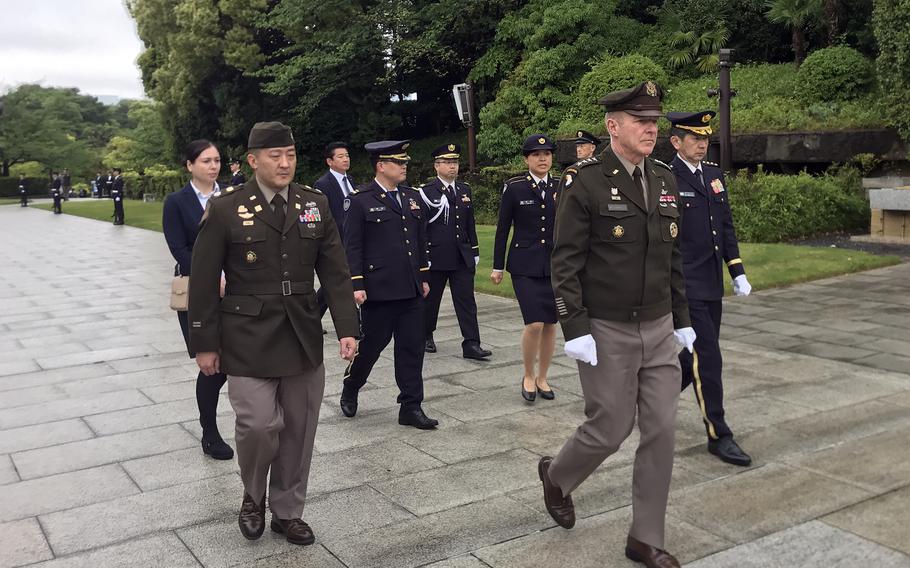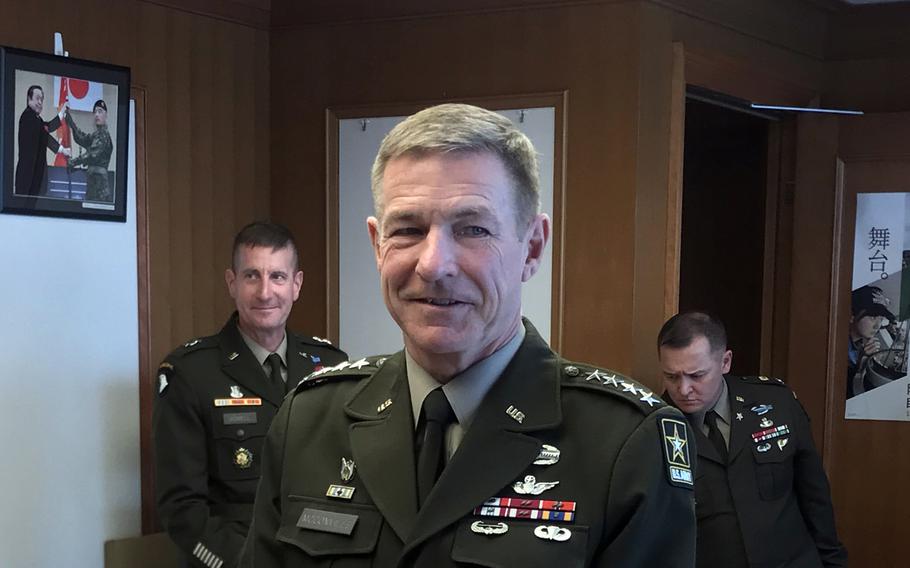
U.S. Army Chief of Staff Gen. James McConville visits a memorial for fallen Japanese soldiers at Camp Ichigaya in Tokyo, Monday, May 8, 2023. (Seth Robson/Stars and Stripes)
TOKYO — The U.S. Army’s top general, during meetings Monday with Japan’s top military officials, pointed to the war in Ukraine as a warning about the dangers of regional conflicts.
Army Chief of Staff Gen. James McConville spoke to Minister of Defense Yasukazu Hamada and the Japan Ground Self-Defense Force’s chief of staff, Gen. Yasunori Morishita, at the ministry in Tokyo.
“We have seen with the attack on Ukraine that it not only affects Europe, but it affects all our partners around the world,” McConville told Hamada at the start of their meeting, with reporters present. “That is why it is so important that we don’t have any regional conflicts.”
Many U.S. defense leaders take seriously a possible Chinese effort to reunify Taiwan by force, based on regular threats by Chinese President Xi Jinping and stepped-up Chinese military activity around the island.

U.S. Army Chief of Staff Gen. James McConville receives an award for service to Japan, the Grand Cordon of the Order of the Rising Sun, at Camp Ichigaya in Tokyo, Monday, May 8, 2023. (Seth Robson/Stars and Stripes)
“I believe in peace through strength and that strength comes from a strong alliance like we have,” McConville told Hamada. “We all benefit from having a free and open Indo-Pacific.”
Training such as the annual Yama Sakura exercise involving U.S. and Japanese forces help build relationships. Those links are not just between militaries but across the whole of government, he said.
“The relationship is as strong as it has ever been,” said McConville, who had earlier inspected an honor guard and placed flowers at a memorial to fallen Japanese soldiers.
Hamada presented the American with an award for service to Japan, the Grand Cordon of the Order of the Rising Sun.
“I hope we can deepen our collaboration in future,” he said.
At the start of another meeting, also with reporters present, Morishita told McConville that Japan’s army is drastically changing.
Japan has moved to strengthen its military amid a rapid Chinese military buildup and North Korean missile tests.
A national security strategy released by the Ministry of Defense in December includes acquiring counterstrike capabilities to attack enemy bases with missiles.
A defense budget for the current fiscal year totaling $51.4 billion includes $1.59 billion to acquire Tomahawk cruise missiles from the U.S. and $963 million to develop and manufacture improved surface-to-ship guided missiles.
“The Japan Ground Self-Defense Force would like to contribute to the stability of this region and also global security,” Morishita said.
Enhanced cooperation with the U.S. and working with like-minded countries in the region are goals, he said.